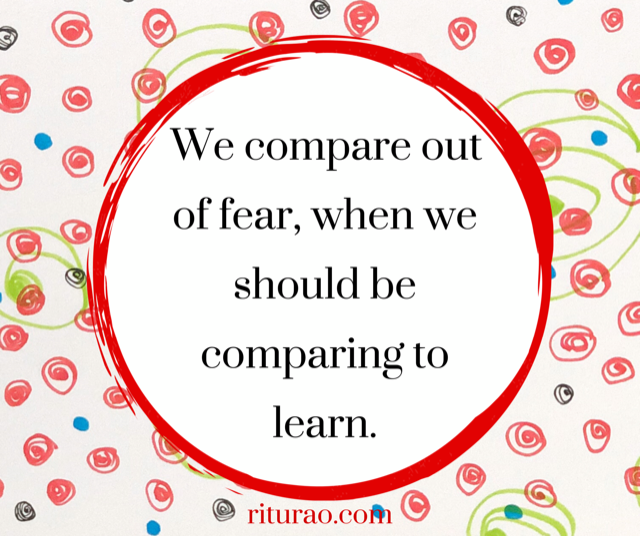
Compare yourself to others? Congrats, you’re human.
Comparison comes naturally because it’s a built-in aspect of our social nature. We’re pack animals, so while the degree might vary, the pack is always our context.
So why are we constantly told we shouldn’t compare ourselves?
It’s because most of us, most of the time, are doing comparison wrong.
We compare out of fear, when we should be comparing to learn.
And they are two very, very different things.
This difference is a huge source of our angst, our fears, our constant internal struggle between our beliefs and our desires.
Not apples and oranges
Comparing out of fear is our ego’s way of gaining certainty, to constantly establish our internal status update—are we below or above or equal to someone else?—and keeping us and our happiness dependent on that answer.
This is why we stay in reaction mode, at the mercy of our circumstances from moment to moment.
You can stay in this mode because it feels natural and claim the reason is biology. Just know the price you’re paying for it.
Comparison is the thief of joy, said Roosevelt.
A better alternative is comparing to learn.
Comparing to learn is much healthier, and eternally more useful.
Comparing yourself to those better than you in knowledge and skills you want to learn, or if you’re a more evolved human, comparing yourself to earlier versions of yourself, is a more appropriate and self-compassionate path to growth.
Let me paint you a picture
If you’re new to, say, painting, you can do one of two things.
You can compare yourself to Vincent van Gogh and say, “I’ll never be van Gogh so why bother trying.”
Or,
you can compare to learn and say, “What can I learn from van Gogh?”
Both are comparisons. But they come from different places.
When our minds are clouded in fear, it’s hard to do what we need. There’s too much drama to keep a clear head. Instead of acting, we react.
We give up too early.
Or we hold on too long.
To compare to learn, to act, we need to cultivate self-awareness.
Awareness is what allows you to detach from negative thoughts and emotions. Anger, self-doubt, hopelessness . . . you know the ones I’m talking about.
Keeping your reactivity low and taking the actions you need leads you to do what’s necessary and helpful in a given situation, and keep going.
Living without evaluation
At the outset, it’s just you, your thoughts and the one you’re comparing yourself to. That’s your context.
When you keep going, when you keep learning from different sources, you’re exposed to a broader range of ideas, perspectives and material.
With each step forward, your context expands.
This helps re-frame your ideas of failure, of not being good enough compared to someone else. It’s not about the narrowness of winning or losing anymore.
You become better at analyzing what’s working and what’s not. You begin to lose interest in constant bench-marking and how you stack up against so-and-so, and more invested in how much further you can go.
Isn’t this what we’re ultimately looking for? To think less about fear and be more of ourselves, our full, best, true selves?
Ahead of the curve
Never compare yourself to others! Well, good luck with that.
You’re trying to let go of your ego; it will only tighten its grip.
Your ego is here for the ride. But you don’t have to let it drive the car.
Comparing to learn, especially in an era where so much is shared, can be an amazing way to amplify your growth, do more or go further, and it’s a smarter, more useful alternative to merely sticking your head in the sand (or stepping on others’ necks) because you’re afraid.
So go ahead, compare yourself.
But do it in a way that moves you forward.
Leave a Reply